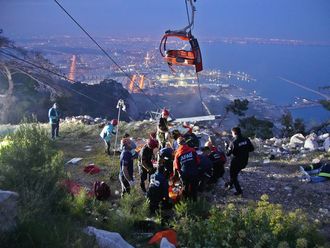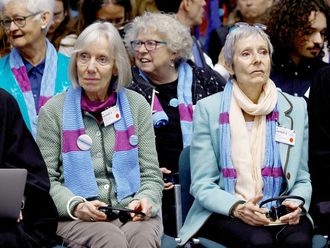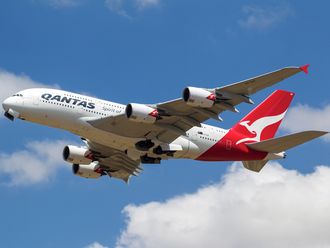Berlin: Germany must grant federal police more powers to counter threats like terrorism and cyber attacks, Interior Minister Thomas de Maiziere said on Tuesday, two weeks after a failed asylum seeker rammed a truck into a Christmas market and killed 12 people.
In his most detailed response yet to the Dec. 19 attack, de Maiziere said Germany lacks laws that other countries have, and police and intelligence bodies are too fragmented.
“Our state must be better prepared for difficult times than it has been,” de Maiziere said at the start of an election year in which immigration and security will be at the top of the political agenda.
“The federal government needs to be able to steer all security authorities where central government and the states work together on national security,” he wrote in a full-page newspaper article in the Frankfurter Allgemeine Zeitung.
Each of the 16 federal states has its own police force and intelligence agency, and the country’s worst attack in more than 35 years has reignited debate about how best to prevent information from falling between the cracks.
After the Christmas market attack, it emerged that Tunisian suspect Anis Amri had spent nearly a year and a half in Germany, using various names and moving between different parts of the country despite being identified as a security threat. For several days he evaded an intensive search, crossing three international borders before being shot dead in Italy.
De Maiziere said the federal police agency should lead national manhunts, and a discussion about centralising intelligence agencies was needed. Better coordination was also required to monitor several hundred individuals believed to pose a threat, including many who have returned from Syria and Iraq.
The minister said Germans should not fear installing more video cameras in public places to help prevent and solve crime.
Germans have an aversion to such measures after mass snooping under the communist East German Stasi and the Nazis.
He also said failed asylum seekers who are viewed as a danger should be held until they can be deported.
Amri, whose attack was claimed by Daesh, was due to be sent home after his asylum application was rejected but Tunisia refused to take him because of missing papers.
Chancellor Angela Merkel, who is seeking a fourth term this year, is under growing pressure for allowing more than a million migrants into Germany over the past two years, which critics say has made the country more vulnerable to an attack.
In the latest twist in a sensitive national debate, police in Cologne are coming under fire for alleged racial profiling and the coining of a new acronym, Nafri, meaning North African Repeat Offenders.
Political parties are divided over immigration and security.
Sigmar Gabriel, leader of the Social Democrats who are part of a grand coalition with Merkel’s conservatives, voiced scepticism about de Maiziere’s comments.
“Mr de Maiziere is making a proposal that means nothing more than a big commission on federalism where the federal government and states sit together and discuss authorities,” he said.
The anti-immigrant Alternative for Germany (AfD), which has gained support at Merkel’s expense, said the conservatives lacked credibility on security. “The party has promised too much in the last few years and not enough has been done,” said senior AfD member Georg Pazderski.
Germany is also concerned that it could be open to a cyber attack in the months leading to the election. The website of the federal police was hacked one day after the Christmas market attack.












